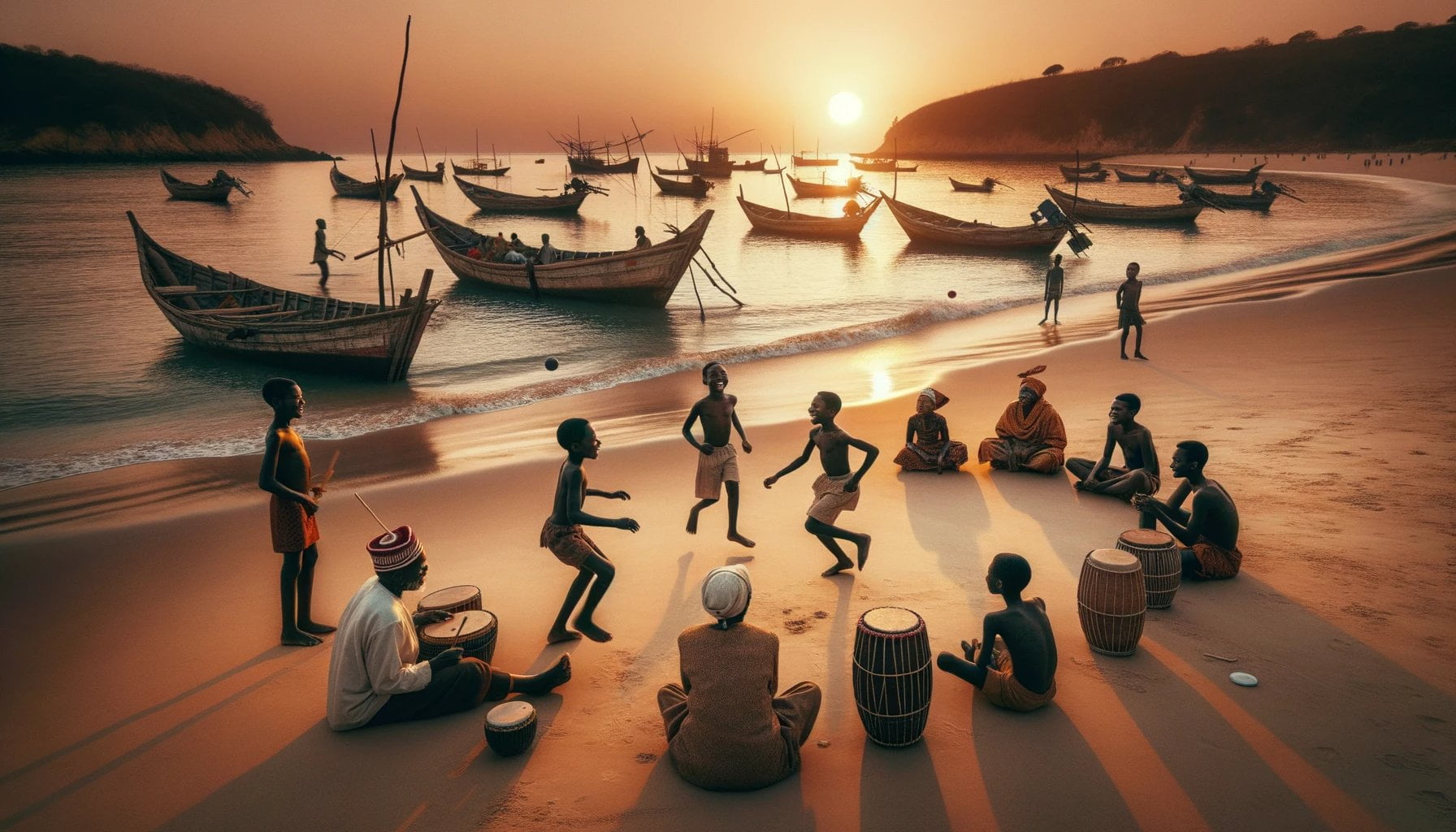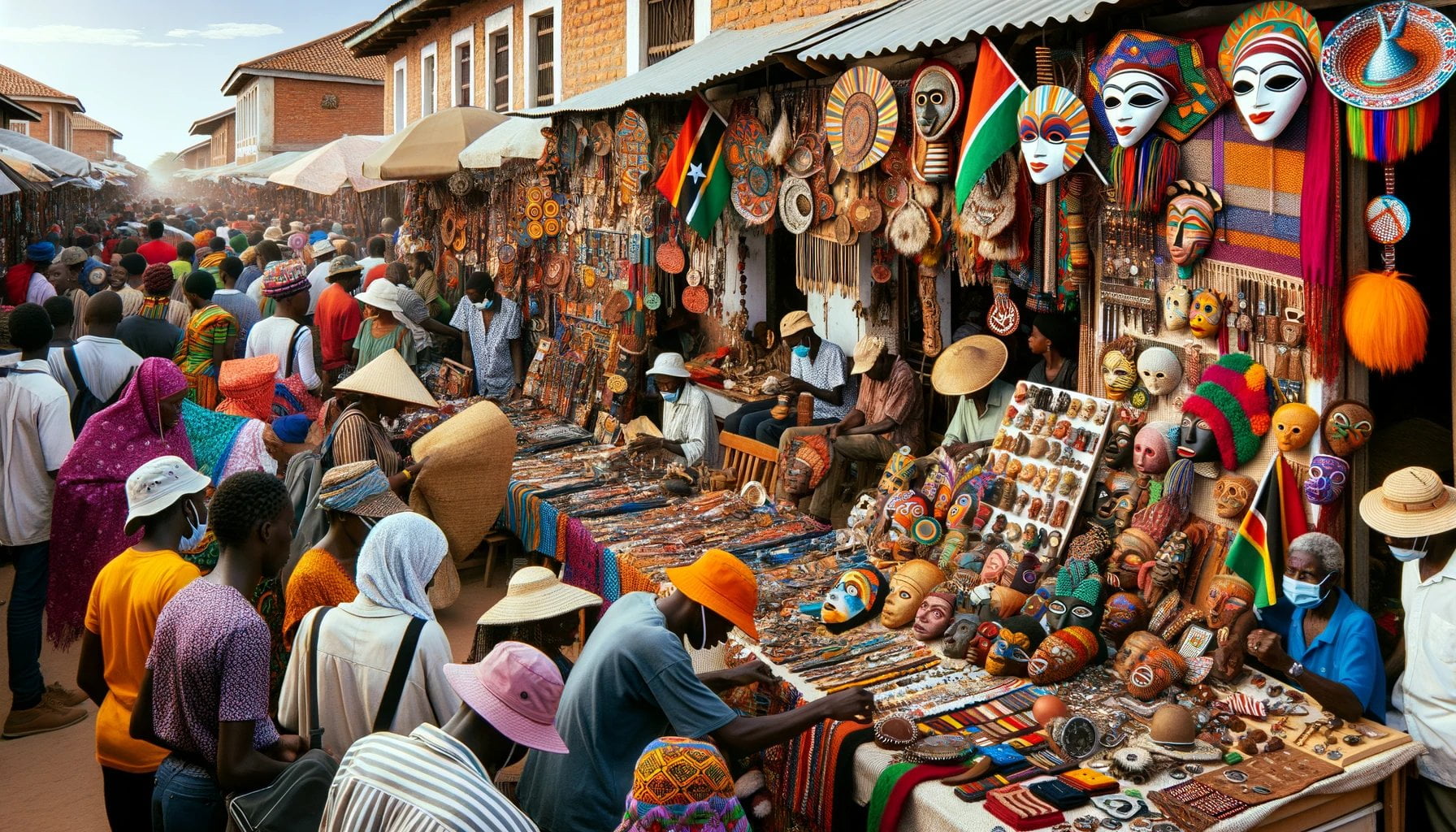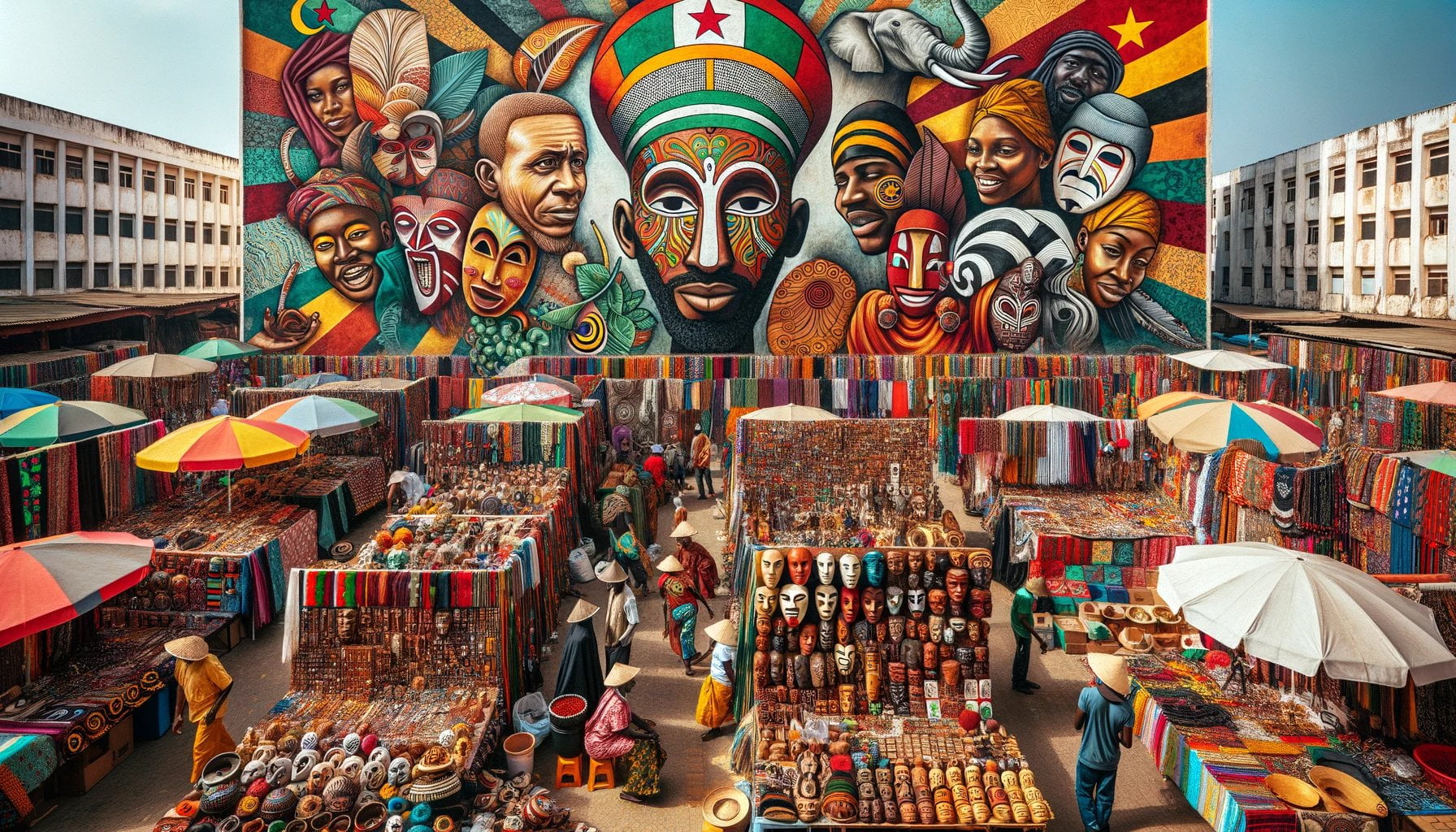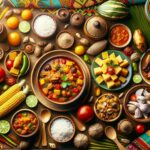Unveiling Angola’s Rich and Vibrant Cultural Heritage takes readers on an immersive journey through the diverse and captivating world of Angola’s culture. From its enchanting history to its mesmerizing music and dance forms, delectable cuisine, and intricate fashion traditions, Angola’s cultural heritage is a treasure trove waiting to be discovered. Join us as we delve into the intricacies and beauty of this African nation’s rich cultural tapestry, shedding light on the hidden gems and traditions that make Angola truly unique.

Key Takeaways:
- The culture of Angola is a blend of Portuguese and Bantu influences, with Portugal’s colonization having a significant impact on the country’s language, religion, and cultural aspects.
- Angolan culture is predominantly native Bantu, with over 100 distinct ethnic groups and languages/dialects, and three dominant ethnic groups – the Ovimbundu, Ambundu, and Bakongo.
- Portuguese is the official language of Angola, but many black Angolans consider it their second or third language.
- Angolan culture is characterized by its diverse ethnic communities, each with its own cultural traits, traditions, and native languages or dialects.
- Portuguese colonization and integration have influenced various aspects of Angolan culture including music, cuisine, clothing, and art.
- Angola has a vibrant music scene influenced by indigenous rhythms and instruments, and basketball is the most popular sport in the country, reflecting its sporting culture.
- Angola offers a diverse range of dishes reflecting its various cultural influences in terms of cuisine.
- Traditional Angolan clothing showcases the unique customs and traditions of different ethnic groups, with colorful patterns and designs.
- Angola is known for its rich artistic expressions including sculpture, painting, and weaving.
- Additional resources for learning more about Angolan culture include WorldAtlas and Britannica’s articles on the topic, providing comprehensive insights into the blend of Portuguese and Bantu influences shaping the nation’s identity.
Angola Culture
When it comes to culture, Angola is a fascinating country that offers a vibrant tapestry of traditions, customs, and influences. With a history shaped by both Portuguese colonization and native Bantu heritage, Angola’s cultural landscape is rich and diverse. In this article, we will delve into the beauty and intricacies of Angola’s cultural heritage.
A Blend of Portuguese and Bantu Influences
Angola’s cultural identity is a fusion of Portuguese and Bantu influences. Portugal established its presence in Angola in the 16th and 17th centuries, and their colonization efforts lasted until 1975. This prolonged period of Portuguese rule left a lasting impact on the country’s culture. The Portuguese language and Roman Catholicism, for instance, are prominent cultural aspects that Angola shares with its former colonizer.
However, it’s important to note that present-day Angolan culture is predominantly rooted in the native Bantu traditions. Over 100 ethnic groups with their own distinct languages, dialects, and customs call Angola home. The Ovimbundu, Ambundu, and Bakongo ethnic groups are the most dominant ones in the country.
While Portuguese is the official language of Angola, many of its black citizens consider it their second or third language. The native Bantu languages play a vital role in preserving the cultural heritage of different communities within Angola.
Exploring Angolan Culture
To truly understand the depth and richness of Angola’s culture, we must explore its various facets. Let’s begin by taking a closer look at some key aspects:
1. Music and Dance
Angolan music is renowned for its diversity and vibrancy. Influenced by indigenous rhythms and instruments, the music scene in Angola encompasses genres such as semba, kizomba, and kuduro. These musical forms not only express the emotions and experiences of the Angolan people but also serve as a means of cultural preservation.
Dance also holds a special place in Angolan culture. From the traditional kizomba dance to the lively semba moves, dancing is deeply ingrained in the social fabric of Angola. It is a medium through which stories and traditions are passed down from one generation to the next.
2. Cuisine
Angolan cuisine is a delightful reflection of the country’s diverse cultural influences. With Portuguese, African, and Brazilian influences, Angola offers a wide range of dishes that tantalize the taste buds. From the flavorful muamba de galinha (chicken stew) to the delectable funge (a cornmeal-based dish), Angolan cuisine is a true gastronomic adventure.
3. Traditional Clothing
Traditional Angolan clothing showcases the customs and traditions of different ethnic groups. Each group has its own unique style, characterized by colorful patterns and designs. The intricate embroidery and vibrant fabrics make traditional Angolan attire a sight to behold. Wearing traditional clothing is a way for Angolans to celebrate their heritage and express their cultural identity.
4. Art and Craftsmanship
Angola boasts a rich artistic heritage, with various forms of expression ranging from sculpture and painting to weaving. Talented artisans bring to life the stories and traditions of their communities through their craftsmanship. The colorful pottery, intricate wood carvings, and beautiful textiles are a testament to Angola’s artistic prowess.
Engaging with Angola’s Cultural Heritage
To fully embrace Angola’s cultural heritage, it is imperative to engage with the local communities and immerse yourself in their traditions. Visit the local markets to witness the vibrant colors and textures of traditional crafts. Attend music and dance performances to experience the energy and rhythm of Angolan culture firsthand. Taste the flavors of Angola by indulging in the diverse cuisine the country has to offer. In doing so, you will gain a deeper appreciation for the intricacies and beauty of Angola’s cultural heritage.
To further enhance your understanding of Angola’s culture, refer to the following sources:
- The Culture of Angola – WorldAtlas: Link
- Explore various aspects of Angolan culture, including society, sports, and performance arts.
- Angola – Culture, Music, Cuisine | Britannica: Link
- Delve into precolonial culture, music, and cuisine in Angola.
Angola’s cultural heritage is a treasure trove waiting to be discovered. By unveiling the country’s rich and vibrant cultural tapestry, we hope to inspire a deeper appreciation for the unique traditions, customs, and identities that shape Angola’s cultural landscape. Join us on this journey as we celebrate the beauty and diversity of Angola’s culture.
Check out these interesting facts about Angola that you probably didn’t know!
Traditional Music and Dance Forms in Angola
Angola, a country known for its rich and diverse cultural heritage, is home to a vibrant array of traditional music and dance forms. These captivating art forms not only entertain but also serve as a means of expressing the history, traditions, and social events of the Angolan people. Let’s explore some of Angola’s notable traditional music and dance forms and discover the beauty they encompass.
1. Semba: The Rhythmic Tale of Angolan Life
Reference: [^1^]
When speaking of traditional music and dance in Angola, one cannot overlook Semba. This lively and energetic dance style holds immense significance and is considered the predecessor to various music genres, including kizomba and kuduro. Semba embraces the essence of Angolan life, often conveying cautionary tales or stories of everyday events through its rhythmic beats and expressive movements. With upbeat rhythms, lively footwork, and spirited choreography, Semba provides a captivating experience that brings people together.
2. Kizomba: A Sensual Celebration of Love and Connection
Reference: [^1^]
Originating in Angola, Kizomba has gained international recognition and captivated audiences with its soulful and intimate nature. The word “Kizomba” translates to “celebration” or “party” in Kimbundu, a Bantu language. This dance style is characterized by slow, sensual movements and the close connection between dance partners. Often danced to romantic and melodic music infused with influences from zouk and semba, Kizomba beautifully expresses emotions and celebrates love. Through its graceful and intricate choreography, Kizomba has left an indelible mark on Angola’s cultural identity.
To gain insight into how Kizomba has renewed Angola’s cultural identity, refer to this source.
3. Kuduro: A High-Energy Fusion of Traditional and Electronic Music
If you’re in search of an electrifying dance experience, look no further than Kuduro. Originating in Angola in the 1980s, Kuduro is characterized by its fast-paced rhythms, intense footwork, and energetic movements. This dance style blends elements of traditional Angolan music with electronic beats, creating a unique and dynamic cultural phenomenon. Kuduro isn’t just popular within Angola, but it has also gained international recognition for its infectious energy and vibrant choreography.
4. Rebita: Preserving Angolan Culture through Synchronized Movements
Rebita, deeply rooted in Angolan culture, is a traditional dance form that has been passed down through generations. It serves as a powerful showcase of Angola’s diverse ethnic groups and is often performed during festive occasions and celebrations. Rebita is characterized by rhythmic and synchronized movements, accompanied by traditional music. Through Rebita, the Angolan people celebrate their heritage, preserve their traditions, and express their creativity.
Key Takeaways:
- Semba, Kizomba, Kuduro, and Rebita are prominent traditional music and dance forms in Angola.
- Semba is characterized by lively rhythms, expressive movements, and storytelling elements.
- Kizomba embraces slow, sensual movements and celebrates love and connection.
- Kuduro is a high-energy dance style that fuses traditional Angolan music with electronic beats.
- Rebita serves as a means of preserving Angolan culture through rhythmic and synchronized movements.
References:
[^1^]: FunTimes Magazine. (2021, November 10). Exploring Angola’s Internationalized Music and Dance Forms. Link
Culinary Delights of Angola
It’s time to tantalize your taste buds with the culinary delights of Angola. This vibrant African country is known for its diverse and flavorful cuisine, which combines indigenous African ingredients with Portuguese influences from other Portuguese colonies like Brazil. Let’s dive into the mouthwatering world of Angolan food and explore some of its most popular dishes.
The Flavors of Angola
Angolan cuisine is a true reflection of the country’s rich cultural heritage. It’s a harmonious blend of Bantu traditions and Portuguese influences, resulting in a unique and diverse culinary experience. The staple ingredients in Angolan food include beans, rice, pork, chicken, and a variety of vegetables like tomatoes and onions. With these simple yet flavorful ingredients, Angolan cooks create dishes that will leave you craving for more.
Traditional Delicacies
One of Angola’s most beloved dishes is Muamba de Galinha, also known as Chicken Stewed in Palm Oil. This mouthwatering chicken stew is made with a base of aromatic palm oil, enhanced by the sweetness of tomatoes, the rich flavor of butternut squash, and the delicate texture of okra. A perfect balance of flavors that will transport your taste buds directly to the heart of Angola.
Another traditional delight is Mufete de Peixe, or Roasted Fish. Imagine a fresh, succulent fish, grilled to perfection and served with vibrant vegetables and fluffy rice. This dish captures the essence of Angolan coastal cuisine and is a true treat for seafood lovers.
For those seeking an authentic taste of Angolan cuisine, Calulu de Peixe is a must-try dish. This traditional fish stew is prepared with a flavorful combination of fish, onions, tomatoes, garlic, and spices. The result is a hearty and aromatic dish that embodies the warmth and richness of Angolan flavors.
Sweet Indulgences
No culinary exploration of Angola would be complete without a taste of their delightful desserts. One popular sweet treat is Bolo de Ginguba, or Peanut Sponge Cake. Made with freshly ground peanuts, this light and fluffy cake will melt in your mouth, leaving a delightful nutty taste that lingers.
Fusion of Flavors
Although Angolan cuisine has its own unique identity, it has also been influenced by Brazilian food in recent years. This cultural exchange has resulted in exciting new dishes that showcase the fusion of flavors from both countries. The main staple ingredients of Angolan food, including flour, beans, rice, fish, pork, chicken, and various vegetables, serve as the canvas for this culinary exploration.
So, if you’re craving a culinary adventure, it’s time to explore the versatile and flavorful world of Angolan food. From hearty stews to fresh grilled fish and delectable desserts, Angola’s culinary delights will tempt your taste buds and leave you wanting more.
Key Takeaways:
- Angola’s cuisine is a delicious blend of indigenous African ingredients and Portuguese influences.
- Some popular dishes in Angola include Muamba de Galinha (Chicken Stewed in Palm Oil), Mufete de Peixe (Roasted Fish), and Calulu de Peixe (Fish Stew).
- Bolo de Ginguba (Peanut Sponge Cake) is a delightful Angolan dessert.
- Angolan cuisine reflects the country’s diverse cultural influences, combining Portuguese, African, and Brazilian elements.
Religious Practices and Beliefs
Religious practices and beliefs hold a significant place in Angola’s rich and vibrant cultural heritage. The diverse religious landscape of Angola reflects the fusion of African traditional beliefs with Christianity and other faiths. Let’s delve into the fascinating world of religious practices and beliefs in Angola.
Animism and Indigenous Religions
In rural areas of Angola, animism and other indigenous religions thrive. Approximately 47% of the population in Angola follows African traditional beliefs either exclusively or in conjunction with other faiths. These traditional beliefs are deeply rooted in the local communities and are often combined with Christianity. Diviners and healers play vital roles in these societies, possessing valuable knowledge and providing guidance to individuals seeking spiritual or physical healing.
The Role of Christianity
Christianity, particularly Roman Catholicism, is influential in Angola. The majority of the population in Angola is either Christian or follows native beliefs. Ancestor worship, a common practice in African traditional religions, is often incorporated into Christian rituals and ceremonies. This integration of Christianity and traditional beliefs reflects the syncretic nature of religiosity in Angola.
Islamic Community
While Islam is a minority religion in Angola, it has a small but significant presence. The Islamic community in Angola has its own places of worship and practices their faith. Their presence adds to the diversity of religious practices in the country.
Indigenous Superstitions
Widespread conflict in Angola has amplified some indigenous superstitions. Many people, especially in rural areas, turn to “lucky charms” like amulets and potions to ward off evil spirits and seek protection. These beliefs provide a sense of security and solace amid the challenging times.
Freedom of Religion
The constitution of Angola guarantees freedom of religion, allowing individuals to practice their faith without fear of persecution or discrimination. This ensures an environment of religious tolerance and fosters cultural diversity and harmony.
Key Takeaways:
- Approximately 47% of the population in Angola follows African traditional beliefs alongside Christianity and other faiths.
- Animism and other indigenous religions thrive in rural areas of Angola, with diviners and healers holding important positions in these societies.
- Christianity, particularly Roman Catholicism, is influential in Angola. Ancestor worship is commonly incorporated into Christian rituals.
- Islam has a small but significant presence in Angola, with its own places of worship and practices.
- Conflict in Angola has heightened indigenous superstitions, leading to the use of “lucky charms” for protection.
- The constitution of Angola ensures freedom of religion, promoting religious tolerance and cultural diversity.
Sources:
– USA Today

FAQ
Q1: What is the cultural heritage of Angola?
A1: Angola has a rich and vibrant cultural heritage, influenced by both Portuguese and Bantu traditions. The country boasts over 100 distinct ethnic groups, each with its own cultural traits, traditions, and languages. Angola’s cultural heritage includes traditional music and dance forms, cuisine, clothing, art, and religious practices.
Q2: What are some notable cultural dances in Angola?
A2: Angola is known for its vibrant traditional dances. Some notable cultural dances include Semba, Kizomba, Kuduro, and Rebita. Semba is characterized by upbeat rhythms and lively footwork, while Kizomba is a slow, sensual dance style. Kuduro is a high-energy dance with fast-paced rhythms, and Rebita is a traditional dance performed during festive occasions.
Q3: What is the influence of Portuguese colonization on Angolan culture?
A3: Portugal occupied Angola for several centuries, which resulted in a blend of Portuguese and Bantu influences in Angolan culture. The Portuguese language and Roman Catholicism are common cultural aspects shared by Angola and Portugal. Portuguese colonization also influenced music, cuisine, clothing, and art in Angola.
Q4: What are some traditional dishes in Angolan cuisine?
A4: Angolan cuisine is a blend of indigenous African ingredients and Portuguese influences. Some traditional dishes include Muamba de Galinha (Chicken Stewed in Palm Oil), Mufete de Peixe (Roasted Fish), Calulu de Peixe (Fish Stew), and Bolo de Ginguba (Peanut Sponge Cake). These dishes showcase the diverse flavors and culinary traditions of Angola.
Q5: What are the main religious beliefs in Angola?
A5: The religious landscape of Angola is diverse, with approximately 47% of the population following African traditional beliefs either exclusively or in conjunction with other faiths. Christianity (Roman Catholicism) is also widely practiced, often combined with traditional beliefs. There is a small Islamic community in Angola, and animism and other indigenous religions are prevalent in rural areas.
- Sept 31 Myth: Unveiling Calendar Secrets - March 18, 2025
- How Long & Till December 18, 2025: Accurate Countdown Guide - March 18, 2025
- Discover Japanese Artists: A Complete History - March 18, 2025
















